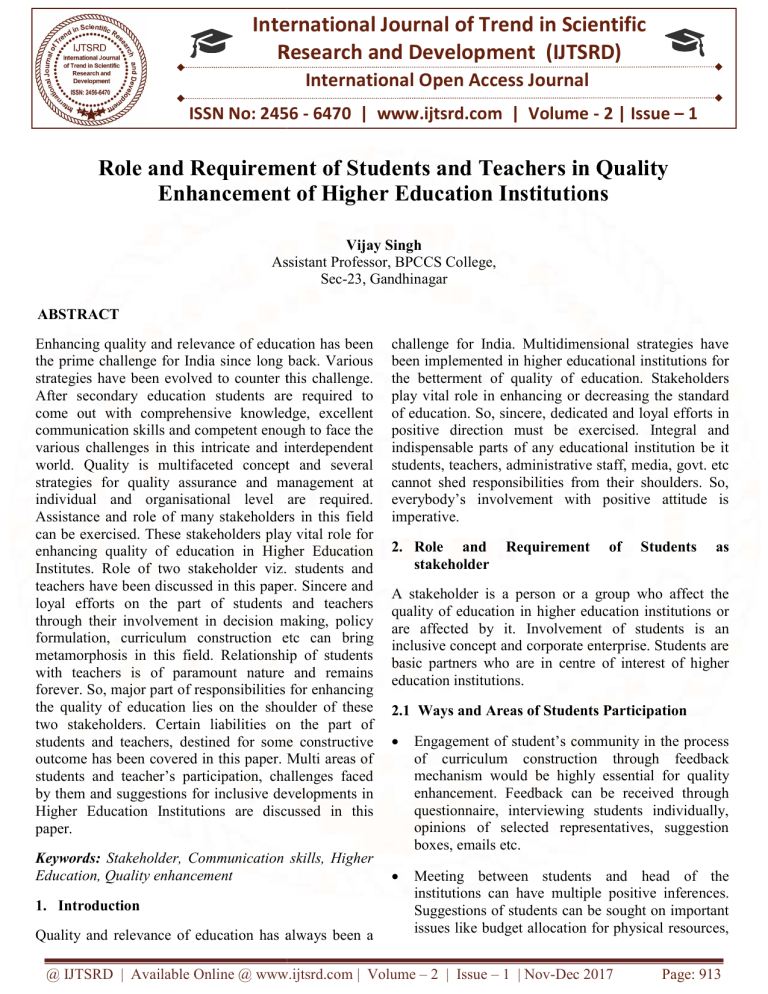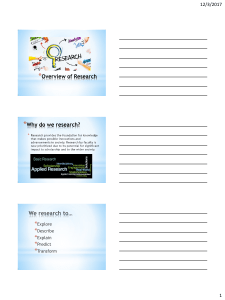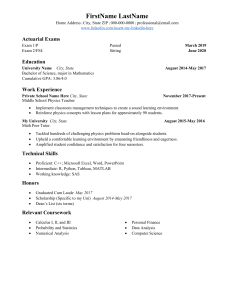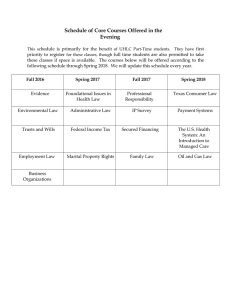
International Journal of Trend in Scientific
Research and Development (IJTSRD)
IJTSRD)
International Open Access Journal
ISSN No: 2456 - 6470 | www.ijtsrd.com | Volume - 2 | Issue – 1
Role and Requirement of Students and Teachers in Quality
Enhancement of Higher Education Institutions
Vijay Singh
Assistant Professor, BPCCS College,
Sec-23, Gandhinagar
ABSTRACT
Enhancing quality and relevance of education has been
the prime challenge for India since long back. Various
strategies have been evolved to counter this challenge.
After secondary education students are required to
come out with comprehensive knowledge, excellent
communication skills and competent enough to face the
various challenges in this intricate and interdependent
world. Quality is multifaceted concept and several
strategies for quality assurance and management at
individual and organisational level are required.
Assistance and role of many stakeholders in this field
can be exercised. These stakeholders play vital role for
enhancing quality of education in Higher Education
Institutes.
titutes. Role of two stakeholder viz. students and
teachers have been discussed in this paper. Sincere and
loyal efforts on the part of students and teachers
through their involvement in decision making, policy
formulation, curriculum construction etc can bring
metamorphosis in this field. Relationship of students
with teachers is of paramount nature and remains
forever. So, major part of responsibilities for enhancing
the quality of education lies on the shoulder of these
two stakeholders. Certain liabilities
ies on the part of
students and teachers, destined for some constructive
outcome has been covered in this paper. Multi areas of
students and teacher’s participation, challenges faced
by them and suggestions for inclusive developments in
Higher Education Institutions
stitutions are discussed in this
paper.
Keywords: Stakeholder, Communication skills, Higher
Education, Quality enhancement
1. Introduction
Quality and relevance of education has always been a
challenge for India. Multidimensional strategies have
been implemented in higher educational institutions for
the betterment of quality of education. Stakeholders
play vital role in enhancing or decreasing the standard
of education. So, sincere, dedicated and loyal efforts in
positive direction must be exercised. Integral and
indispensable parts of any educational institution be it
students, teachers, administrative staff, media, govt. etc
cannot shed responsibilities from their shoulders. So,
everybody’s involvement with positive attitude is
imperative.
2. Role and
stakeholder
Requirement
equirement
of
Students
as
A stakeholder is a person or a group who affect the
quality of education in higher education institutions or
are affected by it. Involvement of students is an
inclusive concept and corporate enterprise. Students are
basic
sic partners who are in centre of interest of higher
education institutions.
2.1 Ways and Areas of Students Participation
Engagement of student’s community in the process
of curriculum construction through feedback
mechanism would be highly essential for quality
qual
enhancement. Feedback can be received through
questionnaire, interviewing students individually,
opinions of selected representatives, suggestion
boxes, emails etc.
Meeting between students and head of the
institutions can have multiple positive inferences.
infere
Suggestions of students can be sought on important
issues like budget allocation for physical resources,
@ IJTSRD | Available Online @ www.ijtsrd.com | Volume – 2 | Issue – 1 | Nov-Dec
Dec 2017
Page: 913
International Journal of Trend in Scientific Research and Development (IJTSRD) ISSN: 2456-6470
annual programme, procurements of infrastructure
for laboratory and library etc. Suggestions given by
the students may be discussed upon for
implementation or rejection. Action plan on given
suggestions may be worked upon.
must be arranged for students to ensure maximum
and effective involvement.
Feedback on learning experiences of students
should be received in first half of a semester. So
that any discrepancy or limitation can be rectified in
subsequent semesters to ensure quality.
Student’s feedback must be acknowledged on
priority to establish a credible and transparent
environment.
Ratio of student’s participation in decision making
should be enhanced for maximum output.
2.2 Problems in Student’s participation
There are lot many problems in ensuring student’s
useful participation in different activities of education
institutions.
Student’s representatives should be elected rather
than appointed.
3. Role and requirement of Teacher as Stakeholder
Participation of students may be ensured in decision
making bodies of govt., management including
curriculum.
Working area of student’s council can be enhanced
to realise maximum involvement of students which
can bring forth innovative ideas for better
education.
Student’s voice is not acknowledged genuinely in
determining the nature and contents of courses. It is
the teachers and management who decide this.
Students are not given right to have the content of
their choice.
Teachers have narrow conception of student’s
participation.
In feedback mechanism, questionnaire presented are
not relevant to students. Like this students are not
able to voice their suggestions which they want
actually.
Students are not comfortable to give their views on
teacher’s capability, way of teaching or knowledge
of subject matter.
Students are less interested in this process. They
have the conception that no action will be initiated
on the part of institution on their feedback.
Student’s voting rights are limited and not
authorized to vote for like administrative and
financial issues, concern staff appointment and
curricula etc.
Students are hard pressed to complete their study
and reluctant to join institutional life.
2.3 Suggestions to Ensure Purposeful Involvement
of students
Training, motivation and awareness programmes
It has been found that 10% Indian youth go to colleges.
Percentage of students going to colleges in developed
countries is 40-50%. According to available data two
third of Indian universities are providing inferior
education, while 90% of college in India are below
average. Most of the institutions have become the
factory of degree only. Teachers as well as students are
running after providing or acquiring degree and not
towards enhancing knowledge and wisdom. Attendance
in colleges has dropped drastically and class room
teaching is becoming only a ritual, to be followed
mechanically.
Though it has been said that destiny of nation is shaped
only in the classroom, very less importance is being
given to classroom teaching. Level of teaching in
Indian institutions is not matched with global quality
standard. Teaching in India does not foster global
competence and are not as per the expectations of
employment sector. Contribution of teachers is viewed
with immense importance to bring metamorphosis in
the quality of higher education. This daunting task of
teachers to improve the quality of education play
crucial role. Teachers are trusted with to bring whole
world in class. This entirely depends upon the potential
and wisdom of teacher. This is the responsibility of the
teachers to create interest in students about subjects.
Teachers are bound to inspire serious as well as nonserious students to take interest in their respective
subjects. Success of any institution depends upon
competence and quality of teacher. How and what
he/she teaches in the class? Quality education is not a
close ended concept but it’s a continuous process and
teacher needs to update him or herself with latest
@ IJTSRD | Available Online @ www.ijtsrd.com | Volume – 2 | Issue – 1 | Nov-Dec 2017
Page: 914
International Journal of Trend in Scientific Research and Development (IJTSRD) ISSN: 2456-6470
methods and technologies invented in this field.
Motivation
Motivation is imperative whenever we undertake some
task. Motivation is a boosting factor to execute
assigned task enthusiastically. In the class, teacher acts
as a motivational force to motivate students to take
interest and think rationally on given task. Due to the
motivation of teacher in the class, learning and
conducive environment is created to have maximum
output.
Skill Enhancement
Skills are part and parcel of everybody’s life. Without
skills no one can excel in life and achieve desired goal.
Skills plays crucial role in student’s life. Skilled
persons with huge calibre are solicited in employment
sector everywhere. It is the responsibility of teacher to
develop the skills of students, be it job skill or
communication skills. This require teacher to be
innovative, creative and entrepreneurial in approach to
develop skills in students. These skills can be enhanced
while establishing contacts with social organisations,
industrial set up and networking with neighbourhood
agencies.
Loyalty
Loyalty and commitment on the part of teachers play
crucial role in student’s life. Teacher’s dedication
towards profession shapes the future of students and
nation. Teacher’s impact on the life of students is
everlasting so a dedicated and committed teacher can
bring metamorphosis in quality of higher education.
Education Imbued with Value
Skills are not of much use if these are devoid of value.
In the absence of suitable value system, skills are
treated with less importance. Teacher should bear the
responsibility to inculcate value system amongst
students to get in right direction. India is a diverse
country in term of geography, culture, religion and
language. But despite of so many pluralities in country,
appropriate core values like truth and righteousness can
be imbibed with life. If students are made to confront
values in early stage, subsequent time will be
conducive for all round development of students.
During gurukul time, students were taught value
lessons of honesty, truthfulness, loyalty, sincerity,
dedication,
self-respect
and
discipline.
But
unfortunately present scenario of higher education is
not in association with these core values. Value
educations give direction to life with satisfaction and
enhance the quality of higher education.
Personality of Teacher
Personality does not mean mere good appearance but
much more than that. Personality is a combination of
multiple traits one teacher should have. Teacher should
be disciplined, having high calibre, thorough
knowledge of subject matter, effective body language,
excellent communication skills and permanent learners.
Teaching and learning is a continuous process which
last till one demise. So it is imperative on the part of
teacher to be a permanent learner while teaching.
Effective personality of teacher affects the teaching and
learning in manifold ways thus enhances the quality of
higher education.
Academic Developments
It has been mentioned that learning is a lifelong
process. Teachers play crucial role not only in
enhancing the quality of education but also maintaining
this. And it is possible only when teacher is also
learning continuously. There is induction of new
methods and invention of latest technology in education
sphere. It is very much important for all teachers to
acquaint themselves with latest technological tools used
in education field and new methods of teaching.
Effective teaching can be realised through two facts i.e.
teachers are familiar with new inventions in the field of
education and researchers know the area of problem
faced by teacher and students in classroom interaction.
Teachers should incessantly attend seminars and
workshop organised by different agencies. Teachers
should be well versed in using latest technological tools
used for effective teaching and learning. Refreshers
course should be attended by teachers to update and
enhance their existing knowledge.
Self-Rating
Teachers should self-evaluate their teaching to discern
the deficiency and shortcoming in their teacher. This
can be done through analysing the results of students
and their grade. Self-evaluation play crucial role in
enhancing quality of higher education.
Professional Liberty
Teachers should have professional liberty in the class.
Though certain methods have been suggested by higher
authorities to be implemented in the classroom still they
should not dictate the teachers to adopt the same.
Teacher’s professional liberty to do experiment with
@ IJTSRD | Available Online @ www.ijtsrd.com | Volume – 2 | Issue – 1 | Nov-Dec 2017
Page: 915
International Journal of Trend in Scientific Research and Development (IJTSRD) ISSN: 2456-6470
2456
genuine methods of instruction in the class enha
enhances
the quality of higher education. Because teachers know
their students well and know the methods suitable for
effective learning.
5. Khandare, Shyam. "The Role of Teachers for the
Quality Enhancement in Higher Professional
Education." IJARSE 3.12 (2014): 294-98.
294
Web. 06
Dec. 2017.
6. Maassen, P. "Editorial." European Journal of
Education 4 (2000): 377-83.
83. Web. 04 Dec. 2017.
Professional Morality
Teachers have been given the highest place in Indian
society. Teacher is even greater than God as pe
per Hindu
belief system. So teachers must be abide by the
professional ethics and shun the corruption activities in
this sacred profession. If teacher is sincere, honest and
loyal, the same message he/she can give to their
students with full conviction which is essential for
quality education.
4. Conclusion
It can be concluded that students and teachers are two
fundamental pillars of educational edifice. Role of these
two stakeholders for enhancing quality of higher
education is of paramount nature. Role of stud
students in
every decision making relevant to them and competent,
efficient and innovative teacher can surely bring
metamorphosis in quality of higher education. The aim
of quality in higher education can be facilitated if these
two stakeholders are given due attention to their
feedback and requisite resources with infrastructure.
Bibliography
1. Anand, Rakesh. "Building Quality Institutions for
Higher Education in India." University News
News50.22
(2012): n. pag. Web. 07 Dec. 2017.
2. Gnanasekaran, G. "Responsibilities of Teachers in
Higher Education." University News48.23
48.23 (2010):
1-2. Web. 05 Dec. 2017.
3. Gumja, D. "Changing Role of Teachers and Quality
Education in Arunachal." 1.2 (2009): n. pag. Web.
10 Nov. 2017.
4. Hegde, Ganesh.. "Promoting Student Participation in
Quality Enhancement." (2006): n. pag. Web. 05
Dec. 2017.
7. Nagoba, Basavraj S., and Sarita B. Mantri. "Role of
Teacher in Quality Enhancement in Higher
Education." JKIMSU 4.1 (2015): n. pag. Web. 02
Dec. 2017.
8. Pathania, Anita. "Teacher's
"Teacher
Role in Quality
Enhancement and Value education." Academe14.1
(2011): 19-26.
26. Web. 07 Dec. 2017.
9. Prasad, V. S. "NAAC Year of Student
Participation." NAAC News 6 (2006): n. pag. Web.
28 Nov. 2017.
10. Prasad, V. S., and Patil Jagannath. "Student
Participation as Key Element of Quality Assurance
in Higher Education." University News 44.21
(2006): 1-5.
5. Web. 30 Nov. 2017.
Authors Profile:
Vijay Singh,
Singh Assistant
Professor of Soft Skill and
Personality Development
has completed his Bachelor
of Education (B.Ed) from
Jammu University. He has
completed
MA
(Eng
language & Literature)
from Bharathiar University
Coimbatore.
He
has
accomplished
Mphill
Mphil
(English)
from
self
financed
University
named
Kadi
Sarva
Vishwavidyalaya, Gandhinagar. His area of concern is
Soft Skills, Communication Skills, Motivational
lectures, and Personality Development.
@ IJTSRD | Available Online @ www.ijtsrd.com | Volume – 2 | Issue – 1 | Nov-Dec
Dec 2017
Page: 916




